The Speaker's Commentary (13 vols.)
Digital Logos Edition
This product has been transferred from Community Pricing to Pre-Pub. The actual funding level may be lower than it appears, which could delay production. The amount of funding still needed will be evaluated and updated soon.
Overview
"Whilst the Word of God is one, and does not change, it must touch, at new points, the changing phases of physical, philological, and historical knowledge, and so the Comments that suit one generation are felt by another to be obsolete." These words begin The Speaker's Commentary, the collaborated efforts of a team of over 30 top Anglican scholars. The growing controversy concerning historical criticism, polygamy, and racism created a need for an authoritative response from trusted and capable men within the Church. Compelled to address this challenge, the Speaker of the House of Commons, the Right Hon. J. Evelyn Denison, formed a committee with the task of writing a commentary on the entire Bible. Denison and his committee understood the seriousness of these challenges and so took up arms to guard the truth of the Word against their modern critics, such as Frederick Maurice and William Colenso. Through it all, they desired to make the Scriptures plain and clear for the Church - at a time when it was most needed.
Drawing upon the talents F. C. Cook as editor, an exceptionally skilled linguist and biblical scholar, The Holy Bible According to the Authorized Version (A.D. 1611), with an Explanatory and Critical Commentary—or as it is known popularly, The Speaker's Commentary, presents the best of 19th-century Anglican scholarship, having taken over 18 years to complete by a team of more than 30 scholars.
In addition to the complete commentary on the Old and New Testaments, The Speaker's Commentary includes a unique two-volume set on the Apocrypha, continuing the spirit and scholarship of the series to provide a complete commentary of the 1611 Authorized Version.
This collection will be downloaded as three resources: Old Testament, New Testament, and Apocrypha.
- Complete commentary on the Old and New Testaments from the best Anglican scholarship of the 19th century
- Bonus two-volume commentary on the Apocrypha
- Additional excursuses on difficult and important passages
- Contributions from over 30 scholars
"There can be no question that The Speaker's Commentary will supersede all older commentaries for English readers..."
—The Guardian
"We regard these volumes as a specimen of English scholarship of which we need not be ashamed."
—The NonConformist
- Title: The Speaker's Commentary
- Editors: F. C. Cook and Henry Wace
- Publisher: John Murray
- Volumes: 13
- Pages: 7,941
- Volume 1, Part 1: Genesis and Exodus
- Volume 1, Part 2: Leviticus, Numbers, and Deuteronomy
- Volume 2: Joshua, Judges, Ruth, Samuel, and 1 Kings
- Volume 3: 2 Kings, 1–2 Chronicles, Ezra, Nehemiah, and Esther
- Volume 4: Job, Psalms, Proverbs, Ecclesiastes, and Song of Solomon
- Volume 5: Isaiah, Jeremiah, and Lamentations
- Volume 6: Ezekiel, Daniel, and the Minor Prophets
- Volume 7: Matthew, Mark, and Luke
- Volume 8: John and Acts
- Volume 9: Romans, Corinthians, Galatians, Ephesians, Philippians, Colossians, Thessalonians, Timothy, Titus, and Philemon
- Volume 10: Hebrews, James, Peter, John, Jude, and Revelation
- Volume 11: 1–2 Esdras, Tobit, Judith, The Rest of Esther, and Wisdom
- Volume 12: Ecclesiasticus, Baruch, The Epistle of Jeremy, The Song of the Three Holy Children, The History of Susanna, Bel and the Dragon, The Prayer of Manassa, and 1–2 Maccabees
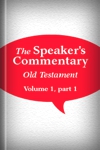
This first volume includes a detailed introduction to the Pentateuch, focusing upon questions of Mosaic authorship and its origins. Verse-by-verse commentary and extensive critical notes are given on Genesis and Exodus, supplemented by two historical essays by F. C. Cook on the insights gleaned from modern studies of ancient Egyptian history.
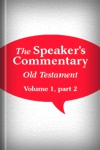
Part two of the first volume completes the verse-by-verse commentary on the Pentateuch, including critical introductions on Leviticus, Numbers, and Deuteronomy.
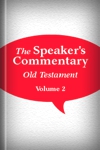
Volume 2 contains exegetical commentary on the historical books, including lengthy introductions delving into issues of authorship, content, structure, and canonical placement.
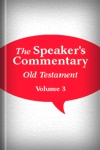
This third volume continues verse-by-verse commentary on 2 Kings, 1–2 Chronicles, Ezra, Nehemiah, and Esther. Each contains in-depth discussion of historical, exegetical, and practical matters, helping readers traverse the difficult waters of the historical book by providing the background information necessary to follow the storyline.
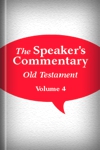
At over 700 pages, The Speaker's Commentary's entry on the Wisdom books and the Psalms is a tremendous resource to assist in digging deep into one of the most theologically and practically rich sections of the Old Testament. Also included are extended excursuses on Psalms 91–100 and the Song of Solomon.
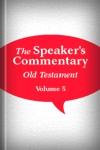
Volume 5 contains critical commentary and introductions for Isaiah, Jeremiah, and Lamentations. In his introduction on Isaiah, Kay gives key background information on the important events and cultural practices during Isaiah's day, helping readers to better appreciate the unity and structure of the book.
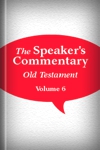
Critical introductions and verse-by-verse commentary on the exhilic books (Ezekiel and Daniel) and the Minor Prophets makes up volume 6.
-
Also contains extended treatment of such topics as:
- Belshazzar and Darius the Mede
- The Messiah
- The Four Kingdoms
- The Belief in the Resurrection
- The Seventy Weeks
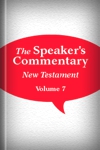
The difficult debate concerning the unity and diversity of the Synoptic Gospels is addressed in volume 7 of The Speaker's Commentary. Critical issues such as interdependency, differences, similarities, and historical background are discussed as a necessary precursor to the verse-by-verse commentary on Matthew, Mark and Luke.
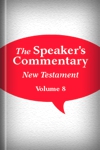
The Gospel of John and the book of Acts are the subject of the eighth volume in The Speaker's Commentary. The introduction on John has an extended discussion on authorship, main themes, and its relation to the Synoptic Gospels.
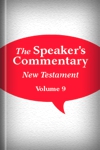
Volume 9: Romans, Corinthians, Galatians, Ephesians, Philippians, Colossians, Thessalonians, Timothy, Titus, Philemon
- Authors: Canon Evans, J. S. Howson, E. H. Gifford, J. Gwynn, John Jackson, Francis Kelly, F. Meyrick, and Joseph Waite
- Editor: F. C. Cook
- Publisher: John Murray
- Publication Date: 1881
- Pages: 844
Verse-by-Verse commentary and notes on the Pauline Epistles comprise volume 9 of the series. An introduction to the pastoral epistles is given a separate section, wherein both their uniqueness from and similarities with the general epistles are discussed.
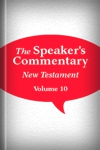
Volume 10 concludes The Speaker's Commentary entries on the New Testament, containing exegetical, historical, and literary notes on Hebrews, James, 1–2 Peter, 1–3 John, Jude and Revelation.
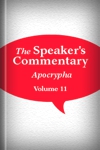
Continuing on with the tradition of the Old and New Testament commentaries, Henry Wave assembled a team of the best Anglican scholars to create a two-volume commentary on the Apocrypha. Carrying on the tradition of the first ten volumes, each book contains a critical introduction discussing typical matters of authorship, dating, genre, and history, as well as verse-by-verse commentary.
-
Books covered:
- 1–2 Esdras
- Tobit
- Judith
- The Rest of Esther
- Wisdom
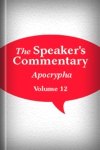
Volume 12: Ecclesiasticus, Baruch, The Epistle of Jeremy, The Song of the Three Holy Children, The History of Susanna, Bel and the Dragon, The Prayer of Manassa, 1–2 Maccabees
- Authors: C. J. Ball, A. Edersheim, E. H. Gifford, G. Rawlinson,
- Editor: Henry Wace
- Publisher: John Murray
- Publication Date: 1888
- Pages: 648
-
Books covered:
- Ecclesiasticus
- Baruch
- The Epistle of Jeremy
- The Song of the Three Holy Children
- The History of Susanna
- Bel and the Dragon
- The Prayer of Manassa
- 1–2 Maccabees
F. C. Cook (1810–1889) was a respected biblical scholar and extraordinary linguist, rumored to have a working knowledge of over 50 languages. As editor of and contributor to The Speaker's Commentary, he was tasked with giving the Anglican Church's response to the growing controversy surrounding the writings and teachings of Bishop Colenso and other modern critics.
Reviews
3 ratings
Monica K Wright
7/1/2020
Benjamin Smith
2/8/2020

Gregorio Billikopf
3/2/2015
Kay's commentary on Isaiah (in volume 5) is one of my favorite commentaries, full of freshness and great ideas. That volume alone is worth the asking price in my opinion. After Alexander and Henderson, it is my most favorite commentary on Isaiah. (Gregorio Billikopf, author of Isaiah Testifies of Christ).